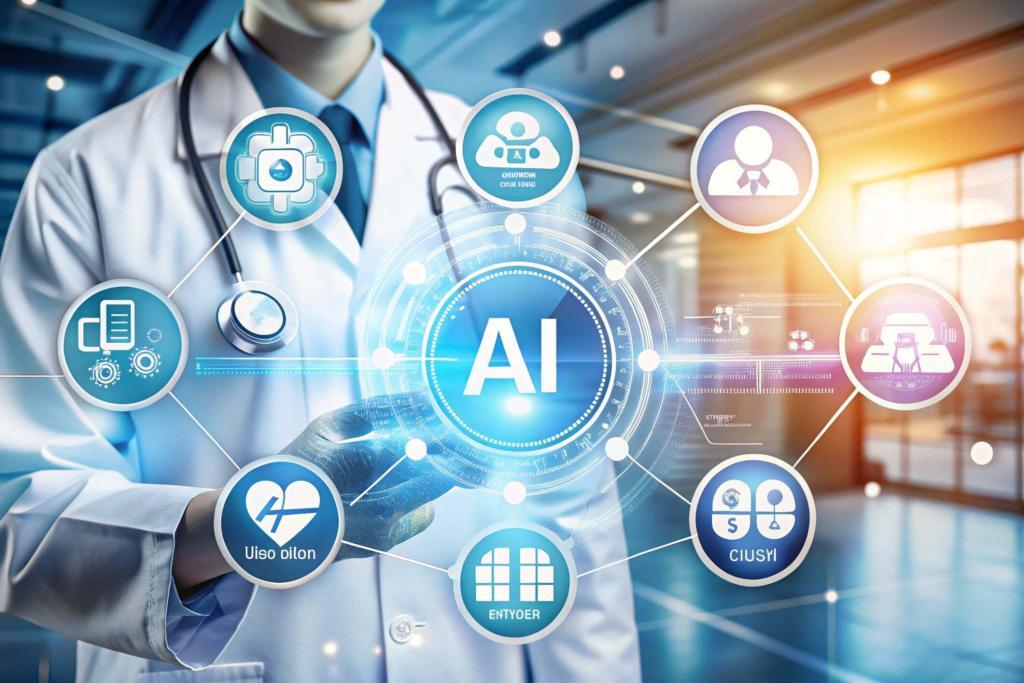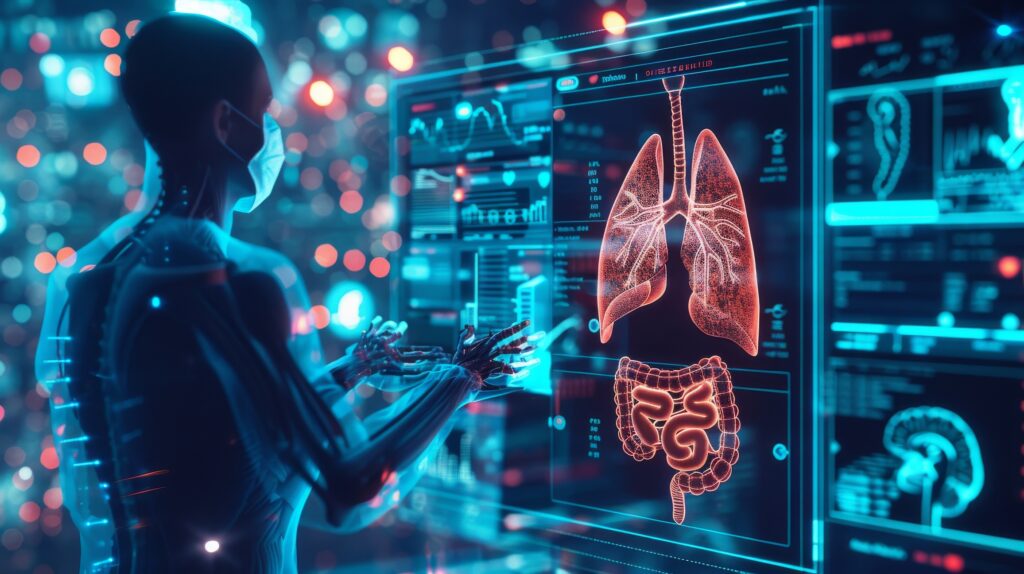Summary: Generative AI is revolutionising the healthcare industry by democratising access to advanced AI applications and enabling transformative innovations. Over the next 12 months, it is poised to have a profound impact, from generating synthetic training data to protecting patient privacy, and enhancing patient care through virtual assistants. This article explores the pivotal role generative AI is playing in healthcare, its potential benefits, and the challenges it must overcome to realise its full potential.
Introduction: Generative AI – A Game-Changer in Healthcare
Artificial Intelligence (AI) has already made significant strides in healthcare, supporting diagnosis, drug discovery, and operational efficiency. Among its various forms, generative AI stands out for its ability to create new, realistic data, simulate scenarios, and provide personalised insights. This capability is set to address some of the most pressing challenges in healthcare, from managing patient privacy to improving accessibility and empowering healthcare professionals with actionable data.
As the world continues to grapple with rising healthcare demands, workforce shortages, and an increasing need for personalised care, generative AI offers timely and transformative solutions.
Democratising Access to AI in Healthcare
One of the greatest promises of generative AI is its ability to democratise access to advanced AI applications. Traditionally, implementing AI in healthcare has required substantial resources, including access to large, high-quality datasets and expertise in AI development. Generative AI simplifies this by automating key processes, enabling smaller healthcare providers, researchers, and under-resourced regions to benefit from cutting-edge AI without prohibitive costs.
- Breaking Down Barriers: Generative AI tools such as ChatGPT or specialised healthcare platforms can bridge knowledge gaps, enabling medical professionals to interpret complex data and generate actionable insights.
- Enhancing Decision-Making: By offering more intuitive interfaces, generative AI ensures that non-technical users can leverage sophisticated algorithms to make informed decisions.
Synthetic Data: A Solution for Privacy and Scarcity
Data is the cornerstone of AI innovation, but accessing sufficient, diverse, and high-quality medical data often poses ethical and logistical challenges. Generative AI offers a groundbreaking solution by creating synthetic datasets—artificially generated data that mimics real-world information while preserving privacy.
Key Benefits of Synthetic Data
- Protecting Patient Privacy:
Generative AI ensures patient anonymity by creating data that reflects real-world patterns without exposing sensitive information. This is particularly valuable in areas like genetic research and rare disease studies. - Addressing Data Scarcity:
Many medical conditions lack sufficient real-world data for AI training. Generative AI fills these gaps by generating realistic datasets, enabling the development of robust diagnostic tools and treatments. - Facilitating Global Collaboration:
Cross-border collaborations often face regulatory hurdles due to data-sharing restrictions. Synthetic data overcomes these barriers, accelerating research and innovation.
Applications in Action
- Training Medical AI Models: Researchers are using synthetic imaging data to train algorithms for detecting conditions like cancer, where acquiring diverse real-world scans can be challenging.
- Simulating Clinical Scenarios: Generative AI creates simulated patient scenarios to test the efficacy of new interventions or diagnostic tools.
Personalised Healthcare Recommendations
Generative AI excels at personalisation, making it a natural fit for tailoring healthcare solutions to individual patients. Its ability to analyse complex datasets and generate targeted recommendations ensures that patients receive the most effective and relevant care.
Use Cases in Personalised Medicine
- Individualised Treatment Plans:
Generative AI can analyse a patient’s genetic makeup, medical history, and lifestyle factors to recommend precise treatment regimens, improving outcomes and minimising side effects. - Medication Adherence:
AI-powered virtual assistants can monitor patients’ medication schedules, send reminders, and offer advice, reducing the risks associated with non-compliance. - Preventative Healthcare:
By analysing risk factors and generating personalised wellness plans, generative AI helps prevent chronic conditions before they develop.
Virtual Assistants: Enhancing Patient Engagement
The patient journey is complex, encompassing diagnosis, treatment, follow-ups, and lifestyle adjustments. Generative AI-powered virtual assistants and chatbots are proving invaluable at every stage of this journey, offering guidance, support, and communication.
Revolutionising Patient Interaction
- Improved Accessibility: Virtual assistants provide 24/7 support, ensuring patients receive timely answers to their queries, irrespective of location or time zone.
- Streamlined Communication: By automating routine tasks like appointment scheduling and prescription refills, generative AI frees up healthcare professionals to focus on critical care.
- Mental Health Support: Generative AI chatbots are being used as accessible, affordable first-line mental health resources, offering empathetic and tailored responses to users.
A Human-Centric Approach
By integrating natural language processing (NLP) capabilities, generative AI-powered assistants can communicate in a conversational, empathetic manner, enhancing patient trust and engagement.
Revolutionising Drug Discovery
Drug development is a notoriously time-consuming and expensive process, but generative AI is shortening timelines and cutting costs by automating key stages of research and development.
Accelerating Discovery
- Identifying Molecular Structures:
Generative AI algorithms can predict molecular interactions and propose novel drug candidates, reducing the need for costly and time-intensive laboratory experiments. - Repurposing Existing Drugs:
AI tools analyse existing pharmaceuticals for potential new uses, enabling faster responses to emerging health crises like pandemics. - Simulating Clinical Trials:
By creating synthetic patient populations, generative AI facilitates early-stage testing of drug efficacy and safety, reducing the reliance on human participants in initial trials.
The Impact of Generative AI in Drug Discovery
Generative AI allows pharmaceutical companies to take data-driven approaches, significantly improving the success rate of new treatments and making cutting-edge therapies more accessible.
Overcoming Challenges
While the potential of generative AI in healthcare is immense, there are challenges that must be addressed to fully harness its capabilities.
Ethical and Regulatory Concerns
- Bias and Fairness: Generative AI models can unintentionally perpetuate biases in the data they are trained on, leading to inequitable outcomes.
- Regulatory Approval: Synthetic data and AI-generated solutions must meet stringent regulatory standards to ensure safety and efficacy.
Integration with Existing Systems
- Many healthcare systems rely on legacy technologies, making it difficult to integrate generative AI tools seamlessly. Upgrading infrastructure and ensuring compatibility is crucial for widespread adoption.
Workforce Adaptation
- Healthcare professionals require training to effectively use generative AI tools. Ensuring they understand AI outputs and can incorporate them into decision-making processes is essential.
Looking Ahead: Generative AI in the Next 12 Months
Over the coming year, generative AI is expected to:
- Expand Telemedicine Capabilities: AI-powered virtual assistants will play a greater role in remote consultations, particularly in underserved areas.
- Enhance Predictive Healthcare: Generative AI will refine predictive models for identifying health risks, enabling earlier interventions.
- Streamline Administrative Processes: By automating documentation and claims processing, AI will reduce administrative burdens on healthcare providers.
Conclusion
Generative AI is at the forefront of healthcare transformation, offering solutions to some of the industry’s most enduring challenges. By democratising access to AI, safeguarding patient privacy, and enhancing patient care, it is paving the way for a more efficient, equitable, and personalised healthcare system.
As stakeholders continue to navigate the ethical, technical, and regulatory hurdles, the next 12 months will be pivotal in defining how generative AI reshapes the healthcare landscape. The potential is immense, and the opportunities to improve lives are unparalleled.
Generative AI is not just the future of healthcare—it is the present, unfolding rapidly before our eyes.
Disclaimer
The content presented in this article is intended for informational purposes only and reflects the views and interpretations of the authors as of the publication date, 23 November 2024. Open Medscience does not provide medical, legal, or professional advice, and the information contained herein should not be relied upon as a substitute for consultation with qualified healthcare professionals or legal experts.
While the article discusses potential applications of generative AI in healthcare, including synthetic data generation, virtual assistants, and drug discovery, these technologies are still subject to ongoing research, regulatory evaluation, and ethical scrutiny. The examples and use cases mentioned are illustrative and do not imply endorsement or guaranteed outcomes.
Readers should be aware that the development and deployment of AI in healthcare involve complex considerations, including data privacy, clinical validation, and regulatory compliance, which may vary across regions and over time.
Open Medscience disclaims any liability for decisions made based on the content of this article. Always seek the guidance of appropriate professionals before acting on any of the ideas or technologies discussed.
home » blog » artificial intelligence »


